第三版新视野大学英语第二册课文翻译
新视野大学英语第三版读写教程第二册课文翻译
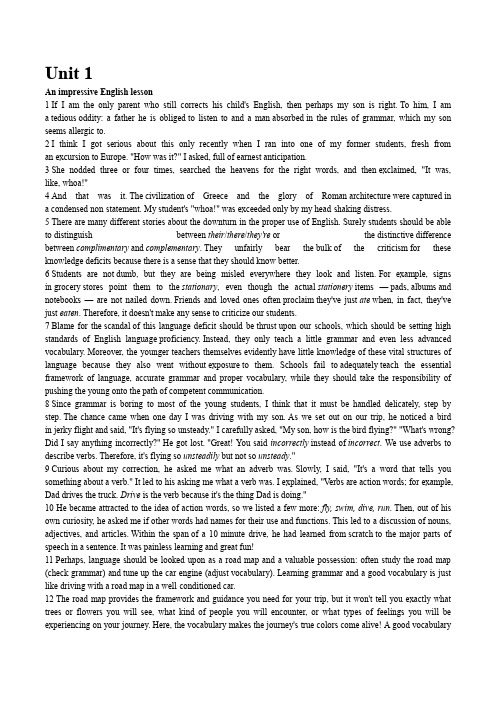
Unit 1An impressive English lesson1If I am the only parent who still corrects his child's English, then perhaps my son is right.To him, I am a tedious oddity: a father he is obliged to listen to and a man absorbed in the rules of grammar, which my son seems allergic to.2I think I got serious about this only recently when I ran into one of my former students, fresh from an excursion to Europe."How was it?" I asked, full of earnest anticipation.3She nodded three or four times, searched the heavens for the right words, and then exclaimed, "It was, like,whoa!"4And that was it.The civilization of Greece and the glory of Roman architecture were captured in a condensed non-statement.My student's "whoa!" was exceeded only by my head-shaking distress.5There are many different stories about the downturn in the proper use of English.Surely students should be able to distinguish between their/there/they're or the distinctive difference between complimentary and complementary.They unfairly bear the bulk of the criticism for these knowledge deficits because there is a sense that they should know better.6Students are not dumb, but they are being misled everywhere they look and listen.For example, signs in grocery stores point them to the stationary, even though the actual stationery items —pads,albums and notebooks — are not nailed down.Friends and loved ones often proclaim they've just ate when, in fact, they've just eaten.Therefore, it doesn't make any sense to criticize our students.7Blame for the scandal of this language deficit should be thrust upon our schools, which should be setting high standards of English language proficiency.Instead, they only teach a little grammar and even less advanced vocabulary.Moreover, the younger teachers themselves evidently have little knowledge of these vital structures of language because they also went without exposure to them. Schools fail to adequately teach the essential framework of language, accurate grammar and proper vocabulary, while they should take the responsibility of pushing the young onto the path of competent communication.8Since grammar is boring to most of the young students, I think that it must be handled delicately, step by step.The chance came when one day I was driving with my son.As we set out on our trip, he noticed a bird in jerky flight and said, "It's flying so unsteady."I carefully asked, "My son, how is the bird flying?""What's wrong? Did I say anything incorrectly?"He got lost."Great! You said incorrectly instead of incorrect. We use adverbs to describe verbs. Therefore, it's flying so unsteadily but not so unsteady."9Curious about my correction, he asked me what an adverb was.Slowly, I said, "It's a word that tells you something about a verb."It led to his asking me what a verb was.I explained, "Verbs are action words; for example, Dad drives the truck.Drive is the verb because it's the thing Dad is doing."10 He became attracted to the idea of action words, so we listed a few more:fly, swim, dive, run.Then, out of his own curiosity, he asked me if other words had names for their use and functions.This led to a discussion of nouns, adjectives, and articles.Within the span of a 10-minute drive, he had learned from scratch to the major parts of speech in a sentence.It was painless learning and great fun!11Perhaps, language should be looked upon as a road map and a valuable possession: often study the road map (check grammar) and tune up the car engine (adjust vocabulary).Learning grammar and a good vocabulary is just like driving with a road map in a well-conditioned car.12The road map provides the framework and guidance you need for your trip, but it won't tell you exactly what trees or flowers you will see, what kind of people you will encounter, or what types of feelings you will be experiencing on your journey.Here, the vocabulary makes the journey's true colors come alive!A good vocabularyenables you to enjoy whatever you see as you drive along.Equipped with grammar and a good vocabulary, you have flexibility and excellent control.While the road map guides your journey to your destination, an excellent vehicle helps you to fully enjoy all of the sights, sounds and experiences along the way.13Effective,precise, and beneficial communication depends upon grammar and a good vocabulary, the two essential assets for students, but they are not being taught in schools.14Just this morning, my son and I were eating breakfast when I attempted to add milk to my tea."Dad," he said, "If I were you, I wouldn't do that. It's sour."15"Oh my!"I said, swelling with pride toward my son, "That's a grammatically perfect sentence. You used were instead of was."16"I know, I know," he said with a long agreeable sigh. "It's the subjunctive mood."17I was, like, whoa!Translation一堂难忘的英语课1 如果我是唯一一个还在纠正小孩英语的家长,那么我儿子也许是对的。
第三版新视野大学英语第二册课文翻译
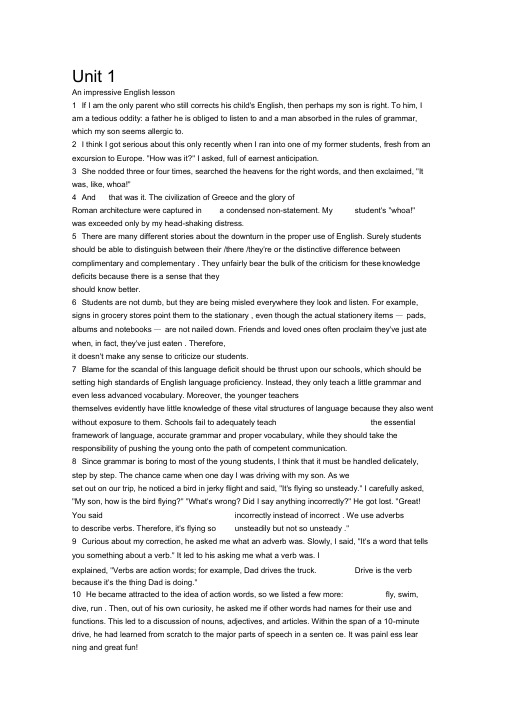
Unit 1An impressive English lesson1 If I am the only parent who still corrects his child's English, then perhaps my son is right. To him, I am a tedious oddity: a father he is obliged to listen to and a man absorbed in the rules of grammar, which my son seems allergic to.2 I think I got serious about this only recently when I ran into one of my former students, fresh from an excursion to Europe. "How was it?" I asked, full of earnest anticipation.3 She nodded three or four times, searched the heavens for the right words, and then exclaimed, "It was, like, whoa!"4 And that was it. The civilization of Greece and the glory ofRoman architecture were captured in a condensed non-statement. My student's "whoa!"was exceeded only by my head-shaking distress.5 There are many different stories about the downturn in the proper use of English. Surely students should be able to distinguish between their /there /they're or the distinctive difference between complimentary and complementary . They unfairly bear the bulk of the criticism for these knowledge deficits because there is a sense that theyshould know better.6 Students are not dumb, but they are being misled everywhere they look and listen. For example, signs in grocery stores point them to the stationary , even though the actual stationery items —pads, albums and notebooks —are not nailed down. Friends and loved ones often proclaim they've just ate when, in fact, they've just eaten . Therefore,it doesn't make any sense to criticize our students.7 Blame for the scandal of this language deficit should be thrust upon our schools, which should be setting high standards of English language proficiency. Instead, they only teach a little grammar and even less advanced vocabulary. Moreover, the younger teachersthemselves evidently have little knowledge of these vital structures of language because they also went without exposure to them. Schools fail to adequately teach the essential framework of language, accurate grammar and proper vocabulary, while they should take the responsibility of pushing the young onto the path of competent communication.8 Since grammar is boring to most of the young students, I think that it must be handled delicately, step by step. The chance came when one day I was driving with my son. As weset out on our trip, he noticed a bird in jerky flight and said, "It's flying so unsteady." I carefully asked, "My son, how is the bird flying?" "What's wrong? Did I say anything incorrectly?" He got lost. "Great! You said incorrectly instead of incorrect . We use adverbsto describe verbs. Therefore, it's flying so unsteadily but not so unsteady ."9 Curious about my correction, he asked me what an adverb was. Slowly, I said, "It's a word that tells you something about a verb." It led to his asking me what a verb was. Iexplained, "Verbs are action words; for example, Dad drives the truck. Drive is the verb because it's the thing Dad is doing."10 He became attracted to the idea of action words, so we listed a few more: fly, swim, dive, run . Then, out of his own curiosity, he asked me if other words had names for their use and functions. This led to a discussion of nouns, adjectives, and articles. Within the span of a 10-minute drive, he had learned from scratch to the major parts of speech in a senten ce. It was painl ess lear ning and great fun!11 Perhaps, la nguage should be looked upon as a road map and a valuable possessi on:ofte n study the road map (check grammar) and tune up the car engine (adjust vocabulary). Lear ning grammar and a good vocabulary is just like drivi ng with a road map in a well-c on diti oned car.12 The road map provides the framework and guida nee you n eed for your trip, but it won't tell you exactly what trees or flowers you will see, what kind of people you will encounter, or what types of feelings you will be experiencing on your journey. Here, the vocabularymakes the journey's true colors come alive! A good vocabulary enables you to enjoy whatever you see as you drive along. Equipped with grammar and a good vocabulary, you have flexibility and excellent control. While the road map guides your journey to your destination, an excellent vehicle helps you to fully enjoy all of the sights, sounds and experie nces along the way.13 Effective, precise, and ben eficial com muni cati on depe nds upon grammar and a good vocabulary, the two esse ntial assets for stude nts, but they are not being taught in schools.14 Just this morning, my son and I were eating breakfast when I attempted to add milk to my tea. "Dad," he said, "If I were you, I would n't do that. It's sour."15 "Oh my!" I said, swelling with pride toward my son, "That's a grammatically perfect sentence. You used were in stead of was ."16 "I kno w, I kno w," he said with a long agreeable sigh. "It's the subj unctive mood."17 I was, like, whoa!Tran slati on一堂难忘的英语课1如果我是唯一一个还在纠正小孩英语的家长,那么我儿子也许是对的。
第三版新视野大学英语第二册课文翻译
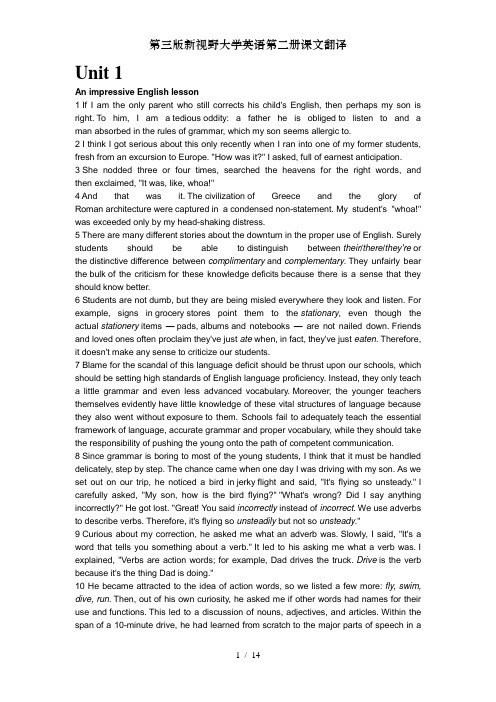
Unit 1An impressive English lesson1 If I am the only parent who still corrects his child's English, then perhaps my son is right. To him, I am a tedious oddity: a father he is obliged to listen to and a man absorbed in the rules of grammar, which my son seems allergic to.2 I think I got serious about this only recently when I ran into one of my former students, fresh from an excursion to Europe. "How was it?" I asked, full of earnest anticipation.3 She nodded three or four times, searched the heavens for the right words, and then exclaimed, "It was, like, whoa!"4 And that was it. The civilization of Greece and the glory of Roman architecture were captured in a condensed non-statement. My student's "whoa!" was exceeded only by my head-shaking distress.5 There are many different stories about the downturn in the proper use of English. Surely students should be able to distinguish between their/there/they're or the distinctive difference between complimentary and complementary. They unfairly bear the bulk of the criticism for these knowledge deficits because there is a sense that they should know better.6 Students are not dumb, but they are being misled everywhere they look and listen. For example, signs in grocery stores point them to the stationary, even though the actual stationery items — pads, albums and notebooks —are not nailed down. Friends and loved ones often proclaim they've just ate when, in fact, they've just eaten. Therefore, it doesn't make any sense to criticize our students.7 Blame for the scandal of this language deficit should be thrust upon our schools, which should be setting high standards of English language proficiency. Instead, they only teach a little grammar and even less advanced vocabulary. Moreover, the younger teachers themselves evidently have little knowledge of these vital structures of language because they also went without exposure to them. Schools fail to adequately teach the essential framework of language, accurate grammar and proper vocabulary, while they should take the responsibility of pushing the young onto the path of competent communication.8 Since grammar is boring to most of the young students, I think that it must be handled delicately, step by step. The chance came when one day I was driving with my son. As we set out on our trip, he noticed a bird in jerky flight and said, "It's flying so unsteady." I carefully asked, "My son, how is the bird flying?" "What's wrong? Did I say anything incorrectly?" He got lost. "Great! You said incorrectly instead of incorrect. We use adverbs to describe verbs. Therefore, it's flying so unsteadily but not so unsteady."9 Curious about my correction, he asked me what an adverb was. Slowly, I said, "It's a word that tells you something about a verb." It led to his asking me what a verb was. I explained, "Verbs are action words; for example, Dad drives the truck. Drive is the verb because it's the thing Dad is doing."10 He became attracted to the idea of action words, so we listed a few more: fly, swim, dive, run. Then, out of his own curiosity, he asked me if other words had names for their use and functions. This led to a discussion of nouns, adjectives, and articles. Within the span of a 10-minute drive, he had learned from scratch to the major parts of speech in asentence. It was painless learning and great fun!11 Perhaps, language should be looked upon as a road map and a valuable possession: often study the road map (check grammar) and tune up the car engine (adjust vocabulary). Learning grammar and a good vocabulary is just like driving with a road map in a well-conditioned car.12 The road map provides the framework and guidance you need for your trip, but it won't tell you exactly what trees or flowers you will see, what kind of people you will encounter, or what types of feelings you will be experiencing on your journey. Here, the vocabulary makes the journey's true colors come alive! A good vocabulary enables you to enjoy whatever you see as you drive along. Equipped with grammar and a good vocabulary, you have flexibility and excellent control. While the road map guides your journey to your destination, an excellent vehicle helps you to fully enjoy all of the sights, sounds and experiences along the way.13 Effective, precise, and beneficial communication depends upon grammar and a good vocabulary, the two essential assets for students, but they are not being taught in schools.14 Just this morning, my son and I were eating breakfast when I attempted to add milk to my tea. "Dad," he said, "If I were you, I wouldn't do that. It's sour."15 "Oh my!" I said, swelling with pride toward my son, "That's a grammatically perfect sentence. You used were instead of was."16 "I know, I know," he said with a long agreeable sigh. "It's the subjunctive mood."17 I was, like, whoa!Translation一堂难忘的英语课1 如果我是唯一一个还在纠正小孩英语的家长,那么我儿子也许是对的。
第三版新视野大学英语第二册课文翻译

第三版新视野大学英语第二册课文翻译Unit 1 FriendshipText A Sweet SixteenA few days ago, I celebrated my sixteenth birthday with a party. The birthday party was held at my house and all of my close friends attended. We had a wonderful time together and created many memories.The preparations for the party started a week in advance. I helped my mother decorate the living room with colorful balloons and streamers. We also set up a table with snacks and drinks for everyone to enjoy. My mother made a delicious cake and I couldn't wait to share it with my friends.When the day of the party finally arrived, I was filled with excitement. I wore my favorite dress and eagerly welcomed my friends as they arrived. We greeted each other with hugs and laughs. The atmosphere was filled with joy and happiness.Throughout the party, we played various games and danced to our favorite songs. We took many photos together, capturing the special moments of our friendship. As the night went on, we sat around the table and talked about our dreams and aspirations for the future. It was a heartwarming experience to hear everyone's hopes and goals.As the clock approached midnight, my friends surprised me with a beautiful gift. It was a scrapbook filled with photos and handwritten messages from each of them. Tears of joy filled my eyes as I realized howmuch they truly cared about our friendship. I felt so blessed to have such amazing friends in my life.The party ended with a group hug and promises to keep in touch. Although it was a bittersweet moment, I knew that our bond would remain strong no matter the distance between us. The memories we created that night will forever be cherished in my heart.In conclusion, my sixteenth birthday party was an unforgettable event. It brought me closer to my friends and allowed us to celebrate our friendship. I am grateful for the love and support they have shown me throughout the years. As we move forward in life, I know that our friendship will only grow stronger.。
新视野大学英语(第三版)读写教程第二册课文翻译(全)
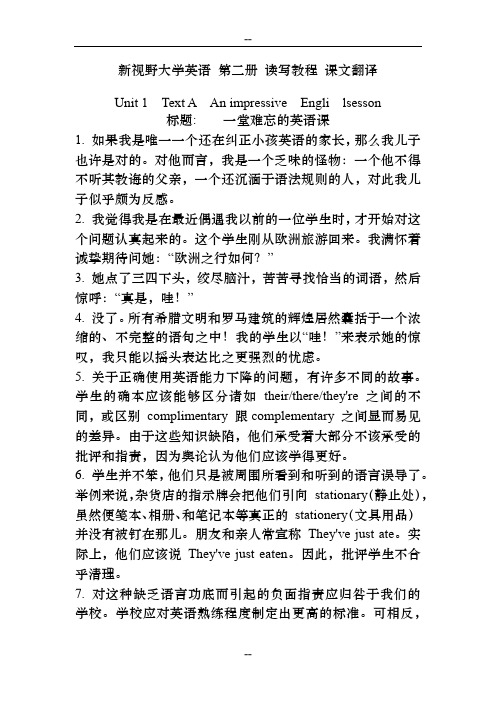
新视野大学英语第二册读写教程课文翻译Unit 1 Text A An impressive Engli lsesson标题: 一堂难忘的英语课1. 如果我是唯一一个还在纠正小孩英语的家长,那么我儿子也许是对的。
对他而言,我是一个乏味的怪物:一个他不得不听其教诲的父亲,一个还沉湎于语法规则的人,对此我儿子似乎颇为反感。
2. 我觉得我是在最近偶遇我以前的一位学生时,才开始对这个问题认真起来的。
这个学生刚从欧洲旅游回来。
我满怀着诚挚期待问她:“欧洲之行如何?”3. 她点了三四下头,绞尽脑汁,苦苦寻找恰当的词语,然后惊呼:“真是,哇!”4. 没了。
所有希腊文明和罗马建筑的辉煌居然囊括于一个浓缩的、不完整的语句之中!我的学生以“哇!”来表示她的惊叹,我只能以摇头表达比之更强烈的忧虑。
5. 关于正确使用英语能力下降的问题,有许多不同的故事。
学生的确本应该能够区分诸如their/there/they're 之间的不同,或区别complimentary 跟complementary 之间显而易见的差异。
由于这些知识缺陷,他们承受着大部分不该承受的批评和指责,因为舆论认为他们应该学得更好。
6. 学生并不笨,他们只是被周围所看到和听到的语言误导了。
举例来说,杂货店的指示牌会把他们引向stationary(静止处),虽然便笺本、相册、和笔记本等真正的stationery(文具用品)并没有被钉在那儿。
朋友和亲人常宣称They've just ate。
实际上,他们应该说They've just eaten。
因此,批评学生不合乎清理。
7. 对这种缺乏语言功底而引起的负面指责应归咎于我们的学校。
学校应对英语熟练程度制定出更高的标准。
可相反,学校只教零星的语法,高级词汇更是少之又少。
还有就是,学校的年轻教师显然缺乏这些重要的语言结构方面的知识,因为他们过去也没接触过。
学校有责任教会年轻人进行有效的语言沟通,可他们并没把语言的基本框架一一准确的语法和恰当的词汇一一充分地传授给学生。
新视野大学英语(第三版)读写教程第二册原文和翻译

An impressive English lesson一堂难忘的英语课1.If I am the only parent who still corrects his child's English, then perhaps my sonis right.To him, I am atedious oddity: a father he is obliged to listen to and a man absorbed in the rules of grammar, which my son seems allergic to.1 如果我是唯一一个还在纠正小孩英语的家长,那么我儿子也许是对的。
对他而言,我是一个乏味的怪物:一个他不得不听其教诲的父亲,一个还沉湎于语法规则的人,对此我儿子似乎颇为反感。
2.I think I got serious about this only recently when I ran into one of my formerstudents, fresh from anexcursion to Europe."How was it?" I asked, full ofearnest anticipation.2 我觉得我是在最近偶遇我以前的一位学生时,才开始对这个问题认真起来的。
这个学生刚从欧洲旅游回来。
我满怀着诚挚期待问她:“欧洲之行如何?”3.She nodded three or four times, searched the heavens for the right words, andthen exclaimed, "It was, like, whoa!"3 她点了三四下头,绞尽脑汁,苦苦寻找恰当的词语,然后惊呼:“真是,哇!”4.And that was it. The civilization of Greece and the glory ofRoman architecture were captured in a condensed non-statement. My student's "whoa!" was exceeded only by my head-shaking distress.4 没了。
新视野大学英语第三版读写教程第二册课文翻译

Unit 1An impressive English lesson1If I am the only parent who still corrects his child's English, then perhaps my son is right.To him, I am a tedious oddity: a father he is obliged to listen to and a man absorbed in the rules of grammar, which my son seems allergic to.2I think I got serious about this only recently when I ran into one of my former students, fresh from an excursion to Europe."How was it?" I asked, full of earnest anticipation.3She nodded three or four times, searched the heavens for the right words, and then exclaimed, "It was, like,whoa!"4And that was it.The civilization of Greece and the glory of Roman architecture were captured in a condensed non-statement.My student's "whoa!" was exceeded only by my head-shaking distress.5There are many different stories about the downturn in the proper use of English.Surely students should be able to distinguish between their/there/they're or the distinctive difference between complimentary and complementary.They unfairly bear the bulk of the criticism for these knowledge deficits because there is a sense that they should know better.6Students are not dumb, but they are being misled everywhere they look and listen.For example, signs in grocery stores point them to the stationary, even though the actual stationery items —pads,albums and notebooks — are not nailed down.Friends and loved ones often proclaim they've just ate when, in fact, they've just eaten.Therefore, it doesn't make any sense to criticize our students.7Blame for the scandal of this language deficit should be thrust upon our schools, which should be setting high standards of English language proficiency.Instead, they only teach a little grammar and even less advanced vocabulary.Moreover, the younger teachers themselves evidently have little knowledge of these vital structures of language because they also went without exposure to them. Schools fail to adequately teach the essential framework of language, accurate grammar and proper vocabulary, while they should take the responsibility of pushing the young onto the path of competent communication.8Since grammar is boring to most of the young students, I think that it must be handled delicately, step by step.The chance came when one day I was driving with my son.As we set out on our trip, he noticed a bird in jerky flight and said, "It's flying so unsteady."I carefully asked, "My son, how is the bird flying?""What's wrong? Did I say anything incorrectly?"He got lost."Great! You said incorrectly instead of incorrect. We use adverbs to describe verbs. Therefore, it's flying so unsteadily but not so unsteady."9Curious about my correction, he asked me what an adverb was.Slowly, I said, "It's a word that tells you something about a verb."It led to his asking me what a verb was.I explained, "Verbs are action words; for example, Dad drives the truck.Drive is the verb because it's the thing Dad is doing."10 He became attracted to the idea of action words, so we listed a few more:fly, swim, dive, run.Then, out of his own curiosity, he asked me if other words had names for their use and functions.This led to a discussion of nouns, adjectives, and articles.Within the span of a 10-minute drive, he had learned from scratch to the major parts of speech in a sentence.It was painless learning and great fun!11Perhaps, language should be looked upon as a road map and a valuable possession: often study the road map (check grammar) and tune up the car engine (adjust vocabulary).Learning grammar and a good vocabulary is just like driving with a road map in a well-conditioned car.12The road map provides the framework and guidance you need for your trip, but it won't tell you exactly what trees or flowers you will see, what kind of people you will encounter, or what types of feelings you will be experiencing on your journey.Here, the vocabulary makes the journey's true colors come alive!A good vocabularyenables you to enjoy whatever you see as you drive along.Equipped with grammar and a good vocabulary, you have flexibility and excellent control.While the road map guides your journey to your destination, an excellent vehicle helps you to fully enjoy all of the sights, sounds and experiences along the way.13Effective,precise, and beneficial communication depends upon grammar and a good vocabulary, the two essential assets for students, but they are not being taught in schools.14Just this morning, my son and I were eating breakfast when I attempted to add milk to my tea."Dad," he said, "If I were you, I wouldn't do that. It's sour."15"Oh my!"I said, swelling with pride toward my son, "That's a grammatically perfect sentence. You used were instead of was."16"I know, I know," he said with a long agreeable sigh. "It's the subjunctive mood."17I was, like, whoa!Translation一堂难忘的英语课1 如果我是唯一一个还在纠正小孩英语的家长,那么我儿子也许是对的。
新视野大学英语(第三版)读写教程第二册原文和翻译
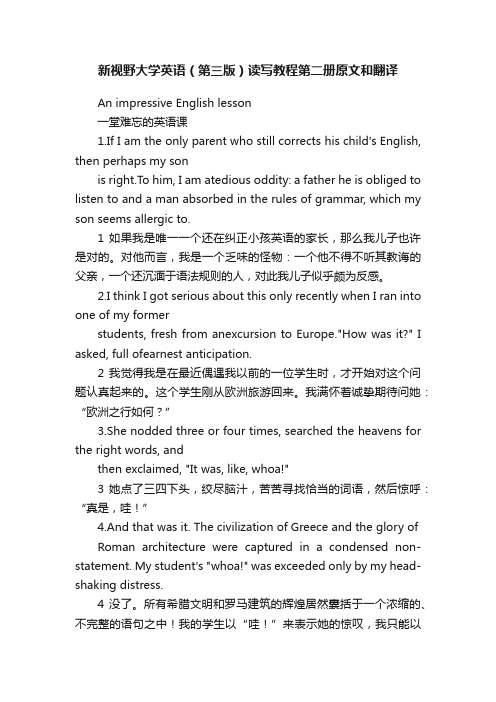
新视野大学英语(第三版)读写教程第二册原文和翻译An impressive English lesson一堂难忘的英语课1.If I am the only parent who still corrects his child's English, then perhaps my sonis right.To him, I am atedious oddity: a father he is obliged to listen to and a man absorbed in the rules of grammar, which my son seems allergic to.1 如果我是唯一一个还在纠正小孩英语的家长,那么我儿子也许是对的。
对他而言,我是一个乏味的怪物:一个他不得不听其教诲的父亲,一个还沉湎于语法规则的人,对此我儿子似乎颇为反感。
2.I think I got serious about this only recently when I ran into one of my formerstudents, fresh from anexcursion to Europe."How was it?" I asked, full ofearnest anticipation.2 我觉得我是在最近偶遇我以前的一位学生时,才开始对这个问题认真起来的。
这个学生刚从欧洲旅游回来。
我满怀着诚挚期待问她:“欧洲之行如何?”3.She nodded three or four times, searched the heavens for the right words, andthen exclaimed, "It was, like, whoa!"3 她点了三四下头,绞尽脑汁,苦苦寻找恰当的词语,然后惊呼:“真是,哇!”4.And that was it. The civilization of Greece and the glory ofRoman architecture were captured in a condensed non-statement. My student's "whoa!" was exceeded only by my head-shaking distress.4 没了。
新视野大学英语第三版读写教程第二册课文汉语翻译

新视野大学英语第三版第二册读写课文所有翻译。
Unit 1 Text A一堂难忘的英语课1 如果我是唯一一个还在纠正小孩英语的家长,那么我儿子也许是对的。
对他而言,我是一个乏味的怪物:一个他不得不听其教诲的父亲,一个还沉湎于语法规则的人,对此我儿子似乎颇为反感。
2 我觉得我是在最近偶遇我以前的一位学生时,才开始对这个问题认真起来的。
这个学生刚从欧洲旅游回来。
我满怀着诚挚期待问她:“欧洲之行如何?”3 她点了三四下头,绞尽脑汁,苦苦寻找恰当的词语,然后惊呼:“真是,哇!”4 没了。
所有希腊文明和罗马建筑的辉煌居然囊括于一个浓缩的、不完整的语句之中!我的学生以“哇!”来表示她的惊叹,我只能以摇头表达比之更强烈的忧虑。
5 关于正确使用英语能力下降的问题,有许多不同的故事。
学生的确本应该能够区分诸如their/there/they're之间的不同,或区别complimentary 跟complementary 之间显而易见的差异。
由于这些知识缺陷,他们承受着大部分不该承受的批评和指责,因为舆论认为他们应该学得更好。
6 学生并不笨,他们只是被周围所看到和听到的语言误导了。
举例来说,杂货店的指示牌会把他们引向stationary(静止处),虽然便笺本、相册、和笔记本等真正的stationery(文具用品)并没有被钉在那儿。
朋友和亲人常宣称They've just ate。
实际上,他们应该说They've just eaten。
因此,批评学生不合乎情理。
7 对这种缺乏语言功底而引起的负面指责应归咎于我们的学校。
学校应对英语熟练程度制定出更高的标准。
可相反,学校只教零星的语法,高级词汇更是少之又少。
还有就是,学校的年轻教师显然缺乏这些重要的语言结构方面的知识,因为他们过去也没接触过。
学校有责任教会年轻人进行有效的语言沟通,可他们并没把语言的基本框架——准确的语法和恰当的词汇——充分地传授给学生。
新视野大学英语第三版第二册Units1-8课文原文+翻译

Unit 1An impressive English lesson1If I am the only parent who still corrects his child's English, then perhaps my son is right.To him, I am a tedious oddity: a father he is obliged to listen to and a man absorbed in the rules of grammar, which my son seems allergic to.2I think I got serious about this only recently when I ran into one of my former students, fresh from an excursion to Europe."How was it?" I asked, full of earnest anticipation.3She nodded three or four times, searched the heavens for the right words, and then exclaimed, "It was, like,whoa!"4And that was it.The civilization of Greece and the glory of Roman architecture were captured in a condensed non-statement.My student's "whoa!" was exceeded only by my head-shaking distress.5There are many different stories about the downturn in the proper use of English.Surely students should be able to distinguish between their/there/they're or the distinctive difference between complimentary and complementary.They unfairly bear the bulk of the criticism for these knowledge deficits because there is a sense that they should know better.6Students are not dumb, but they are being misled everywhere they look and listen.For example, signs in grocery stores point them to the stationary, even though the actual stationery items —pads,albums and notebooks — are not nailed down.Friends and loved ones often proclaim they've just ate when, in fact, they've just eaten.Therefore, it doesn't make any sense to criticize our students.7Blame for the scandal of this language deficit should be thrust upon our schools, which should be setting high standards of English language proficiency.Instead, they only teach a little grammar and even less advanced vocabulary.Moreover, the younger teachers themselves evidently have little knowledge of these vital structures of language because they also went without exposure to them. Schools fail to adequately teach the essential framework of language, accurate grammar and proper vocabulary, while they should take the responsibility of pushing the young onto the path of competent communication.8Since grammar is boring to most of the young students, I think that it must be handled delicately, step by step.The chance came when one day I was driving with my son.As we set out on our trip, he noticed a bird in jerky flight and said, "It's flying so unsteady."I carefully asked, "My son, how is the bird flying?""What's wrong? Did I say anything incorrectly?"He got lost."Great! You said incorrectly instead of incorrect. We use adverbs to describe verbs. Therefore, it's flying so unsteadily but not so unsteady."9Curious about my correction, he asked me what an adverb was.Slowly, I said, "It's a word that tells you something about a verb."It led to his asking me what a verb was.I explained, "Verbs are action words; for example, Dad drives the truck.Drive is the verb because it's the thing Dad is doing."10 He became attracted to the idea of action words, so we listed a few more:fly, swim, dive, run.Then, out of his own curiosity, he asked me if other words had names fortheir use and functions.This led to a discussion of nouns, adjectives, and articles.Within the span of a 10-minute drive, he had learned from scratch to the major parts of speech in a sentence.It was painless learning and great fun!11Perhaps, language should be looked upon as a road map and a valuable possession: often study the road map (check grammar) and tune up the car engine (adjust vocabulary).Learning grammar and a good vocabulary is just like driving with a road map in a well-conditioned car.12The road map provides the framework and guidance you need for your trip, but it won't tell you exactly what trees or flowers you will see, what kind of people you will encounter, or what types of feelings you will be experiencing on your journey.Here, the vocabulary makes the journey's true colors come alive!A good vocabulary enables you to enjoy whatever you see as you drive along.Equipped with grammar and a good vocabulary, you have flexibility and excellent control.While the road map guides your journey to your destination, an excellent vehicle helps you to fully enjoy all of the sights, sounds and experiences along the way.13Effective,precise, and beneficial communication depends upon grammar and a good vocabulary, the two essential assets for students, but they are not being taught in schools.14Just this morning, my son and I were eating breakfast when I attempted to add milk to my tea."Dad," he said, "If I were you, I wouldn't do that. It's sour."15"Oh my!"I said, swelling with pride toward my son, "That's a grammatically perfect sentence. You used were instead of was."16"I know, I know," he said with a long agreeable sigh. "It's the subjunctive mood." 17I was, like, whoa!Translation一堂难忘的英语课1 如果我是唯一一个还在纠正小孩英语的家长,那么我儿子也许是对的。
新视野大学英语读写教程(第三版)第二册课文原文及翻译
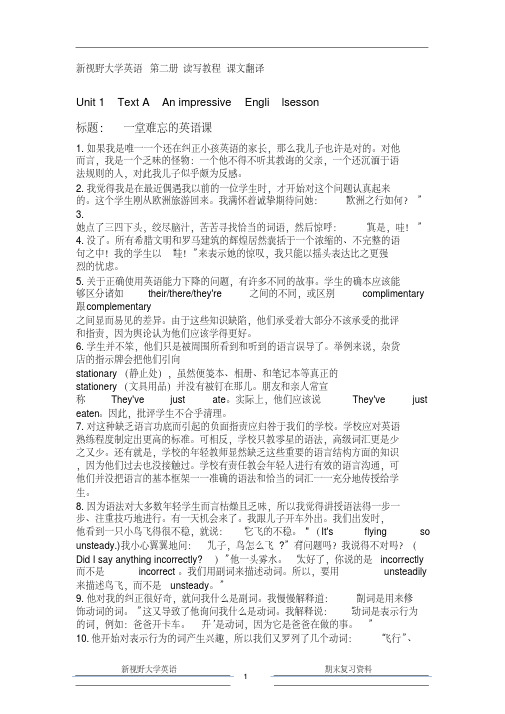
新视野大学英语第二册读写教程课文翻译Unit 1 Text A An impressive Engli lsesson标题: 一堂难忘的英语课1. 如果我是唯一一个还在纠正小孩英语的家长,那么我儿子也许是对的。
对他而言,我是一个乏味的怪物:一个他不得不听其教诲的父亲,一个还沉湎于语法规则的人,对此我儿子似乎颇为反感。
2. 我觉得我是在最近偶遇我以前的一位学生时,才开始对这个问题认真起来的。
这个学生刚从欧洲旅游回来。
我满怀着诚挚期待问她:“欧洲之行如何?” 3.她点了三四下头,绞尽脑汁,苦苦寻找恰当的词语,然后惊呼:“真是,哇!” 4. 没了。
所有希腊文明和罗马建筑的辉煌居然囊括于一个浓缩的、不完整的语句之中!我的学生以“哇!”来表示她的惊叹,我只能以摇头表达比之更强烈的忧虑。
5. 关于正确使用英语能力下降的问题,有许多不同的故事。
学生的确本应该能够区分诸如their/there/they're 之间的不同,或区别complimentary 跟complementary之间显而易见的差异。
由于这些知识缺陷,他们承受着大部分不该承受的批评和指责,因为舆论认为他们应该学得更好。
6. 学生并不笨,他们只是被周围所看到和听到的语言误导了。
举例来说,杂货店的指示牌会把他们引向stationary(静止处),虽然便笺本、相册、和笔记本等真正的stationery(文具用品)并没有被钉在那儿。
朋友和亲人常宣称They've just ate。
实际上,他们应该说They've just eaten。
因此,批评学生不合乎清理。
7. 对这种缺乏语言功底而引起的负面指责应归咎于我们的学校。
学校应对英语熟练程度制定出更高的标准。
可相反,学校只教零星的语法,高级词汇更是少之又少。
还有就是,学校的年轻教师显然缺乏这些重要的语言结构方面的知识,因为他们过去也没接触过。
学校有责任教会年轻人进行有效的语言沟通,可他们并没把语言的基本框架一一准确的语法和恰当的词汇一一充分地传授给学生。
新视野大学英语(第三版)第二册课后翻译答案及原文

新视野大学英语〔第三版〕第二册课后翻译答案及原文Unit 1原文:English is known as a world language, regularly used by many nations whose English is not their first language. Like other languages, English has changed greatly. The history of the English language can be divided into three main periods: Old English, Middle English and Modern English. The English language started with the invasion of Britain by three Germanic tribes during the 5th century AD, and they contributed greatly to the formation of the English language. During the medieval and early modern periods, the influence of English spread throughout the British Isles, and from the early 17th century its influence began to be felt throughout the world. The processes of European exploration and colonization for several centuries led to significant change in English. Today, American English is particularly influential, due to the popularity of American cinema, television, music, trade and technology, including the Internet.翻译:人们普遍认为英语是一种世界语言,经常被许多不以英语为第一语言的国家使用。
新视野第三版大学英语第二册课文翻译
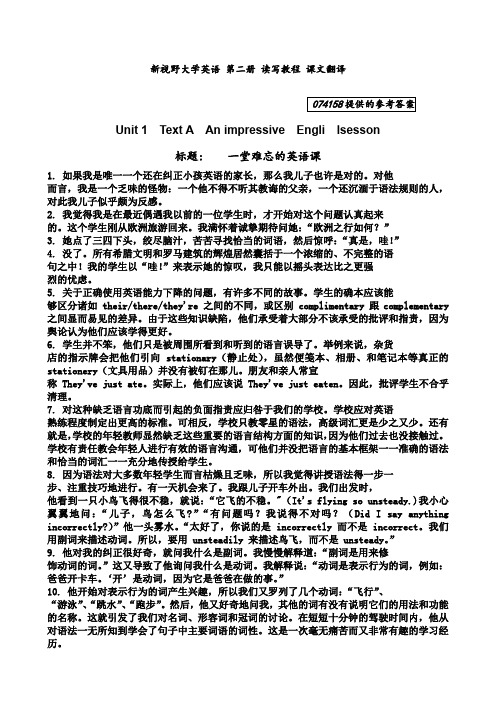
新视野大学英语第二册读写教程课文翻译Unit 1 Text A An impressive Engli lsesson标题: 一堂难忘的英语课1. 如果我是唯一一个还在纠正小孩英语的家长,那么我儿子也许是对的。
对他而言,我是一个乏味的怪物:一个他不得不听其教诲的父亲,一个还沉湎于语法规则的人,对此我儿子似乎颇为反感。
2. 我觉得我是在最近偶遇我以前的一位学生时,才开始对这个问题认真起来的。
这个学生刚从欧洲旅游回来。
我满怀着诚挚期待问她:“欧洲之行如何?”3. 她点了三四下头,绞尽脑汁,苦苦寻找恰当的词语,然后惊呼:“真是,哇!”4. 没了。
所有希腊文明和罗马建筑的辉煌居然囊括于一个浓缩的、不完整的语句之中!我的学生以“哇!”来表示她的惊叹,我只能以摇头表达比之更强烈的忧虑。
5. 关于正确使用英语能力下降的问题,有许多不同的故事。
学生的确本应该能够区分诸如 their/there/they're 之间的不同,或区别 complimentary 跟complementary 之间显而易见的差异。
由于这些知识缺陷,他们承受着大部分不该承受的批评和指责,因为舆论认为他们应该学得更好。
6. 学生并不笨,他们只是被周围所看到和听到的语言误导了。
举例来说,杂货店的指示牌会把他们引向 stationary(静止处),虽然便笺本、相册、和笔记本等真正的stationery(文具用品)并没有被钉在那儿。
朋友和亲人常宣称 They've just ate。
实际上,他们应该说 They've just eaten。
因此,批评学生不合乎清理。
7. 对这种缺乏语言功底而引起的负面指责应归咎于我们的学校。
学校应对英语熟练程度制定出更高的标准。
可相反,学校只教零星的语法,高级词汇更是少之又少。
还有就是,学校的年轻教师显然缺乏这些重要的语言结构方面的知识,因为他们过去也没接触过。
学校有责任教会年轻人进行有效的语言沟通,可他们并没把语言的基本框架一一准确的语法和恰当的词汇一一充分地传授给学生。
新视野大学英语第三版第二册读写课文翻译

精心整理新视野大学英语第三版第二册读写课文所有翻译Unit 1 Text A一堂难忘的英语课1 如果我是唯一一个还在纠正小孩英语的家长,那么我儿子也许是对的。
对他不该承受的批评和指责,因为舆论认为他们应该学得更好。
6 学生并不笨,他们只是被周围所看到和听到的语言误导了。
举例来说,杂货店的指示牌会把他们引向stationary(静止处),虽然便笺本、相册、和笔记本等真正的stationery(文具用品)并没有被钉在那儿。
朋友和亲人常宣称They've just ate。
实际上,他们应该说 They've just eaten。
因此,批评学生不合乎情理。
7 对这种缺乏语言功底而引起的负面指责应归咎于我们的学校。
学校应对英语熟练程度制定出更高的标准。
可相反,学校只教零星的语法,高级词汇更是少之又少。
还有就是,学校的年轻教师显然缺乏这些重要的语言结构方面的知识,为的词,例如:爸爸开卡车。
‘开’是动词,因为它是爸爸在做的事。
”10 他开始对表示行为的词产生兴趣,所以我们又罗列了几个动词:“飞行”、“游泳”、“跳水”、“跑步”。
然后,他又好奇地问我,其他的词有没有说明它们的用法和功能的名称。
这就引发了我们对名词、形容词和冠词的讨论。
在短短十分钟的驾驶时间内,他从对语法一无所知到学会了句子中主要词语的词性。
这是一次毫无痛苦而又非常有趣的学习经历。
11 也许,语言应该被看成是一张路线图和一件珍品:我们要常常查看路线图(核对语法)和调整汽车的引擎(调节词汇)。
学好语法和掌握大量的词汇就好比拿着路线图在车况良好的车里驾驶。
15 “哦,上帝!” 我满怀着无比的骄傲说道,“这是一句语法完全正确的句子。
你用了were而不是was。
”16 “我知道,我知道,”他愉悦地舒了口气,“这是虚拟语气!”17 这下轮到我“哇!”了。
Unit 2 Text A人文学科:过时了吗?1 当形势变得困难时,强者会去选学会计。
新视野大学英语第三版读写教程第二册课文翻译

Unit 1An impressive English lesson1If I am the only parent who still corrects his child's English, then perhaps my son is right.To him, I am a tedious oddity: a father he is obliged to listen to and a man absorbed in the rules of grammar, which my son seems allergic to.2I think I got serious about this only recently when I ran into one of my former students, fresh from an excursion to Europe."How was it?" I asked, full of earnest anticipation.3She nodded three or four times, searched the heavens for the right words, and then exclaimed, "It was, like,whoa!"4And that was it.The civilization of Greece and the glory of Roman architecture were captured in a condensed non-statement.My student's "whoa!" was exceeded only by my head-shaking distress.5There are many different stories about the downturn in the proper use of English.Surely students should be able to distinguish between their/there/they're or the distinctive difference between complimentary and complementary.They unfairly bear the bulk of the criticism for these knowledge deficits because there is a sense that they should know better.6Students are not dumb, but they are being misled everywhere they look and listen.For example, signs in grocery stores point them to the stationary, even though the actual stationery items —pads,albums and notebooks — are not nailed down.Friends and loved ones often proclaim they've just ate when, in fact, they've just eaten.Therefore, it doesn't make any sense to criticize our students.7Blame for the scandal of this language deficit should be thrust upon our schools, which should be setting high standards of English language proficiency.Instead, they only teach a little grammar and even less advanced vocabulary.Moreover, the younger teachers themselves evidently have little knowledge of these vital structures of language because they also went without exposure to them. Schools fail to adequately teach the essential framework of language, accurate grammar and proper vocabulary, while they should take the responsibility of pushing the young onto the path of competent communication.8Since grammar is boring to most of the young students, I think that it must be handled delicately, step by step.The chance came when one day I was driving with my son.As we set out on our trip, he noticed a bird in jerky flight and said, "It's flying so unsteady."I carefully asked, "My son, how is the bird flying?""What's wrong? Did I say anything incorrectly?"He got lost."Great! You said incorrectly instead of incorrect. We use adverbs to describe verbs. Therefore, it's flying so unsteadily but not so unsteady."9Curious about my correction, he asked me what an adverb was.Slowly, I said, "It's a word that tells you something about a verb."It led to his asking me what a verb was.I explained, "Verbs are action words; for example, Dad drives the truck.Drive is the verb because it's the thing Dad is doing."10 He became attracted to the idea of action words, so we listed a few more:fly, swim, dive, run.Then, out of his own curiosity, he asked me if other words had names for their use and functions.This led to a discussion of nouns, adjectives, and articles.Within the span of a 10-minute drive, he had learned from scratch to the major parts of speech in a sentence.It was painless learning and great fun!11Perhaps, language should be looked upon as a road map and a valuable possession: often study the road map (check grammar) and tune up the car engine (adjust vocabulary).Learning grammar and a good vocabulary is just like driving with a road map in a well-conditioned car.12The road map provides the framework and guidance you need for your trip, but it won't tell you exactly what trees or flowers you will see, what kind of people you will encounter, or what types of feelings you will be experiencing on your journey.Here, the vocabulary makes the journey's true colors come alive!A good vocabularyenables you to enjoy whatever you see as you drive along.Equipped with grammar and a good vocabulary, you have flexibility and excellent control.While the road map guides your journey to your destination, an excellent vehicle helps you to fully enjoy all of the sights, sounds and experiences along the way.13Effective,precise, and beneficial communication depends upon grammar and a good vocabulary, the two essential assets for students, but they are not being taught in schools.14Just this morning, my son and I were eating breakfast when I attempted to add milk to my tea."Dad," he said, "If I were you, I wouldn't do that. It's sour."15"Oh my!"I said, swelling with pride toward my son, "That's a grammatically perfect sentence. You used were instead of was."16"I know, I know," he said with a long agreeable sigh. "It's the subjunctive mood."17I was, like, whoa!Translation一堂难忘的英语课1 如果我是唯一一个还在纠正小孩英语的家长,那么我儿子也许是对的。
新视野大学英语读写教程(第三版)第二册课文原文及翻译
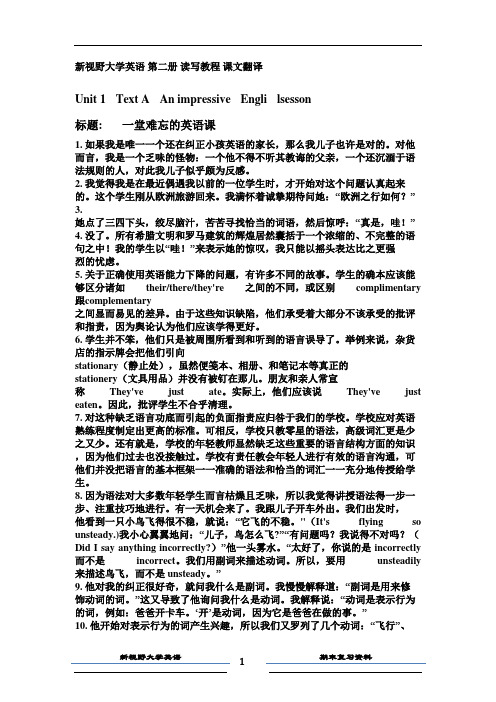
新视野大学英语第二册读写教程课文翻译Unit 1 Text A An impressive Engli lsesson标题: 一堂难忘的英语课1. 如果我是唯一一个还在纠正小孩英语的家长,那么我儿子也许是对的。
对他而言,我是一个乏味的怪物:一个他不得不听其教诲的父亲,一个还沉湎于语法规则的人,对此我儿子似乎颇为反感。
2. 我觉得我是在最近偶遇我以前的一位学生时,才开始对这个问题认真起来的。
这个学生刚从欧洲旅游回来。
我满怀着诚挚期待问她:“欧洲之行如何?”3.她点了三四下头,绞尽脑汁,苦苦寻找恰当的词语,然后惊呼:“真是,哇!”4. 没了。
所有希腊文明和罗马建筑的辉煌居然囊括于一个浓缩的、不完整的语句之中!我的学生以“哇!”来表示她的惊叹,我只能以摇头表达比之更强烈的忧虑。
5. 关于正确使用英语能力下降的问题,有许多不同的故事。
学生的确本应该能够区分诸如their/there/they're 之间的不同,或区别complimentary 跟complementary之间显而易见的差异。
由于这些知识缺陷,他们承受着大部分不该承受的批评和指责,因为舆论认为他们应该学得更好。
6. 学生并不笨,他们只是被周围所看到和听到的语言误导了。
举例来说,杂货店的指示牌会把他们引向stationary(静止处),虽然便笺本、相册、和笔记本等真正的stationery(文具用品)并没有被钉在那儿。
朋友和亲人常宣称They've just ate。
实际上,他们应该说They've just eaten。
因此,批评学生不合乎清理。
7. 对这种缺乏语言功底而引起的负面指责应归咎于我们的学校。
学校应对英语熟练程度制定出更高的标准。
可相反,学校只教零星的语法,高级词汇更是少之又少。
还有就是,学校的年轻教师显然缺乏这些重要的语言结构方面的知识,因为他们过去也没接触过。
学校有责任教会年轻人进行有效的语言沟通,可他们并没把语言的基本框架一一准确的语法和恰当的词汇一一充分地传授给学生。
新视野大学英语读写教程【第三版】第二册课文原文与翻译

Unit 1Text A An impressive English lesson一堂难忘的英语课1 If I am the only parent who still corrects his child's English, then perhaps my son is right. To him, Iam a tedious oddity: a father he is obliged to listen to and a man absorbed in the rules of grammar,which my son seems allergic to.如果我是唯一一个还在纠正小孩英语的家长,那么我儿子也许是对的。
对他而言,我是一个乏味的怪物:一个他不得不听其教诲的父亲,一个还沉湎于语法规则的人,对此我儿子似乎颇为反感。
2 I think I got serious about this only recently when I ran into one of my former students, fresh from an excursion to Europe."How was it?" I asked, full of earnest anticipation.我觉得我是在最近偶遇我以前的一位学生时,才开始对这个问题认真起来的。
这个学生刚从欧洲旅游回来。
我满怀着诚挚期待问她:“欧洲之行如何?”3 She nodded three or four times, searched the heavens for the right words, and then exclaimed, "It was, like, whoa!"她点了三四下头,绞尽脑汁,苦苦寻找恰当的词语,然后惊呼:“真是,哇!”4 And that was it. The civilization of Greece and the glory of Roman architecture were captured in a condensed non-statement.My student's "whoa!" was exceeded only by my head-shaking distress.没了。
(完整版)第三版新视野大学英语第二册课文翻译

Unit 1An impressive English lesson1 If I am the only parent who still corrects his child's English, then perhaps my son is right. To him, I am a tedious oddity: a father he is obliged to listen to and a man absorbed in the rules of grammar, which my son seems allergic to.2 I think I got serious about this only recently when I ran into one of my former students, fresh from an excursion to Europe. "How was it?" I asked, full of earnest anticipation.3 She nodded three or four times, searched the heavens for the right words, and then exclaimed, "It was, like, whoa!"4 And that was it. The civilization of Greece and the glory of Roman architecture were captured in a condensed non-statement. My student's "whoa!" was exceeded only by my head-shaking distress.5 There are many different stories about the downturn in the proper use of English. Surely students should be able to distinguish between their/there/they're or the distinctive difference between complimentary and complementary. They unfairly bear the bulk of the criticism for these knowledge deficits because there is a sense that they should know better.6 Students are not dumb, but they are being misled everywhere they look and listen. For example, signs in grocery stores point them to the stationary, even though the actual stationery items — pads, albums and notebooks —are not nailed down. Friends and loved ones often proclaim they've just ate when, in fact, they've just eaten. Therefore, it doesn't make any sense to criticize our students.7 Blame for the scandal of this language deficit should be thrust upon our schools, which should be setting high standards of English language proficiency. Instead, they only teach a little grammar and even less advanced vocabulary. Moreover, the younger teachers themselves evidently have little knowledge of these vital structures of language because they also went without exposure to them. Schools fail to adequately teach the essential framework of language, accurate grammar and proper vocabulary, while they should take the responsibility of pushing the young onto the path of competent communication.8 Since grammar is boring to most of the young students, I think that it must be handled delicately, step by step. The chance came when one day I was driving with my son. As we set out on our trip, he noticed a bird in jerky flight and said, "It's flying so unsteady." I carefully asked, "My son, how is the bird flying?" "What's wrong? Did I say anything incorrectly?" He got lost. "Great! You said incorrectly instead of incorrect. We use adverbs to describe verbs. Therefore, it's flying so unsteadily but not so unsteady."9 Curious about my correction, he asked me what an adverb was. Slowly, I said, "It's a word that tells you something about a verb." It led to his asking me what a verb was. I explained, "Verbs are action words; for example, Dad drives the truck. Drive is the verb because it's the thing Dad is doing."10 He became attracted to the idea of action words, so we listed a few more: fly, swim, dive, run. Then, out of his own curiosity, he asked me if other words had names for their use and functions. This led to a discussion of nouns, adjectives, and articles. Within the span of a 10-minute drive, he had learned from scratch to the major parts of speech in asentence. It was painless learning and great fun!11 Perhaps, language should be looked upon as a road map and a valuable possession: often study the road map (check grammar) and tune up the car engine (adjust vocabulary). Learning grammar and a good vocabulary is just like driving with a road map in a well-conditioned car.12 The road map provides the framework and guidance you need for your trip, but it won't tell you exactly what trees or flowers you will see, what kind of people you will encounter, or what types of feelings you will be experiencing on your journey. Here, the vocabulary makes the journey's true colors come alive! A good vocabulary enables you to enjoy whatever you see as you drive along. Equipped with grammar and a good vocabulary, you have flexibility and excellent control. While the road map guides your journey to your destination, an excellent vehicle helps you to fully enjoy all of the sights, sounds and experiences along the way.13 Effective, precise, and beneficial communication depends upon grammar and a good vocabulary, the two essential assets for students, but they are not being taught in schools.14 Just this morning, my son and I were eating breakfast when I attempted to add milk to my tea. "Dad," he said, "If I were you, I wouldn't do that. It's sour."15 "Oh my!" I said, swelling with pride toward my son, "That's a grammatically perfect sentence. You used were instead of was."16 "I know, I know," he said with a long agreeable sigh. "It's the subjunctive mood."17 I was, like, whoa!Translation一堂难忘的英语课1 如果我是唯一一个还在纠正小孩英语的家长,那么我儿子也许是对的。
- 1、下载文档前请自行甄别文档内容的完整性,平台不提供额外的编辑、内容补充、找答案等附加服务。
- 2、"仅部分预览"的文档,不可在线预览部分如存在完整性等问题,可反馈申请退款(可完整预览的文档不适用该条件!)。
- 3、如文档侵犯您的权益,请联系客服反馈,我们会尽快为您处理(人工客服工作时间:9:00-18:30)。
Unit 1An impressive English lesson1 If I am the only parent who still corrects his child's English, then perhaps my son is right. To him, I am a tedious oddity: a father he is obliged to listen to and a man absorbed in the rules of grammar, which my son seems allergic to.2 I think I got serious about this only recently when I ran into one of my former students, fresh from an excursion to Europe. "How was it" I asked, full of earnest anticipation.3 She nodded three or four times, searched the heavens for the right words, and then exclaimed, "It was, like, whoa!"4 And that was it. The civilization of Greece and the glory of Roman architecture were captured in a condensed non-statement. My student's "whoa!" was exceeded only by my head-shaking distress.5 There are many different stories about the downturn in the proper use of English. Surely students should be able to distinguish between their/there/they're or the distinctive difference between complimentary and complementary. They unfairly bear the bulk of the criticism for these knowledge deficits because there is a sense that they should know better.6 Students are not dumb, but they are being misled everywhere they look and listen. For example, signs in grocery stores point them to the stationary, even though the actual stationery items —pads, albums and notebooks — are not nailed down. Friends and loved ones often proclaim they've just ate when, in fact, they've just eaten. Therefore, it doesn't make any sense to criticize our students.7 Blame for the scandal of this language deficit should be thrust upon ourschools, which should be setting high standards of English language proficiency. Instead, they only teach a little grammar and even less advanced vocabulary. Moreover, the younger teachers themselves evidently have little knowledge of these vital structures of language because they also went without exposure to them. Schools fail to adequately teach the essential framework of language, accurate grammar and proper vocabulary, while they should take the responsibility of pushing the young onto the path of competent communication.8 Since grammar is boring to most of the young students, I think that it must be handled delicately, step by step. The chance came when one day I was driving with my son. As we set out on our trip, he noticed a bird in jerky flight and said, "It's flying so unsteady." I carefully asked, "My son, how is the bird flying" "What's wrong Did I say anything incorrectly" He got lost. "Great! You said incorrectly instead of incorrect. We use adverbs to describe verbs. Therefore, it's flying so unsteadily but not so unsteady."9 Curious about my correction, he asked me what an adverb was. Slowly, I said, "It's a word that tells you something about a verb." It led to his asking me what a verb was. I explained, "Verbs are action words; for example, Dad drives the truck. Drive is the verb because it's the thing Dad is doing."10 He became attracted to the idea of action words, so we listed a few more: fly, swim, dive, run. Then, out of his own curiosity, he asked me if other words had names for their use and functions. This led to a discussion of nouns, adjectives, and articles. Within the span of a 10-minute drive, he had learned from scratch to the major parts of speech in a sentence. It was painless learning and great fun!11 Perhaps, language should be looked upon as a road map and a valuable possession: often study the road map (check grammar) and tune up the car engine(adjust vocabulary). Learning grammar and a good vocabulary is just like driving with a road map in a well-conditioned car.12 The road map provides the framework and guidance you need for your trip, but it won't tell you exactly what trees or flowers you will see, what kind of people you will encounter, or what types of feelings you will be experiencing on your journey. Here, the vocabulary makes the journey's true colors come alive! A good vocabulary enables you to enjoy whatever you see as you drive along. Equipped with grammar and a good vocabulary, you have flexibility and excellent control. While the road map guides your journey to your destination, an excellent vehicle helps you to fully enjoy all of the sights, sounds and experiences along the way.13 Effective, precise, and beneficial communication depends upon grammar anda good vocabulary, the two essential assets for students, but they are not being taught in schools.14 Just this morning, my son and I were eating breakfast when I attempted to add milk to my tea. "Dad," he said, "If I were you, I wouldn't do that. It's sour."15 "Oh my!" I said, swelling with pride toward my son, "That's a grammatically perfect sentence. You used were instead of was."16 "I know, I know," he said with a long agreeable sigh. "It's the subjunctive mood."17 I was, like, whoa!Translation一堂难忘的英语课1 如果我是唯一一个还在纠正小孩英语的家长,那么我儿子也许是对的。
